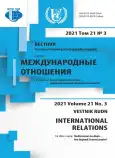Россия в Большом Средиземноморье: новый тихоокеанско-европейский транзит
- Авторы: Чихарев И.А.1
-
Учреждения:
- Московский государственный университет имени М.В. Ломоносова
- Выпуск: Том 21, № 3 (2021): Бассейн Средиземного моря – новый региональный комплекс безопасности?
- Страницы: 441-458
- Раздел: ТЕМАТИЧЕСКОЕ ДОСЬЕ
- URL: https://journal-vniispk.ru/2313-0660/article/view/320293
- DOI: https://doi.org/10.22363/2313-0660-2021-21-3-441-458
- ID: 320293
Цитировать
Полный текст
Аннотация
Актуальность затрагиваемых в статье вопросов связана с активным возвращением России в Средиземноморский регион, а также происходящими в нем международно-политическими трансформациями. Цель статьи - выявление исторических оснований, современного состояния и стратегических перспектив присутствия и международного влияния России в регионе Большого Средиземноморья (БС). Статья опирается на методологию критической геополитики, историко-сравнительный подход, с помощью которых анализируются геополитические конструкции региона, построенные в интересах различных региональных и внерегиональных политических сил. Используется исторический материал древнего, средневекового, нового и новейшего периодов в истории макрорегиона, включая малоизученные времена монгольского присутствия на восточных берегах Средиземного моря. В научный оборот вводятся работы по истории, географии и международным отношениям в регионе, написанные в XVIII-XIX вв., а также современная научная информация о тенденциях технологического, инфраструктурного и политического развития Средиземноморья. Важным элементом является тезис об особой роли России в тихоокеанско-европейском (евразийском) транзите. С точки зрения автора, он включает в себя не только полноценную реализацию транспортно-логистического потенциала России в макрорегионе, но и трансфер современных технологий, а также содействие формированию устойчивых политических режимов. Делается вывод о глубоких исторических основаниях присутствия и влияния России в регионе, обосновываются его стратегические перспективы, выделяются основные направления международной деятельности Российской Федерации в Средиземноморском регионе. Важным выводом статьи является тезис о необходимости многостороннего сбалансированного подхода к решению макрорегиональных проблем.
Об авторах
Иван Александрович Чихарев
Московский государственный университет имени М.В. Ломоносова
Автор, ответственный за переписку.
Email: ichikharev@yandex.ru
ORCID iD: 0000-0002-8573-9271
кандидат политических наук, доцент кафедры геополитики факультета глобальных процессов
Москва, Российская ФедерацияСписок литературы
- Abulafia, D. (2005). Mediterraneans. In W. V. Harris (Ed.), Rethinking the Mediterranean (pp. 64—94). Oxford: Oxford University Press.
- Abulafia, D. (2010). The Great Sea: A human history of the Mediterranean. Oxford: Oxford University Press.
- Arbatova, N. K. (1990). Mediterranean: Problems of security. Moscow: Nauka publ. (In Russian).
- Ascherson, N. (2017). Black Sea. The birthplace of civilization and barbarism. Moscow: Corpus publ. (In Russian).
- Bicchi, F. (2011). The Union for the Mediterranean, or the changing context of Euro-Mediterranean relations. Mediterranean Politics, 16(1), 3—19. https://doi.org/10.1080/13629395.2011.547365
- Braudel, F. (2002). The Mediterranean and the Mediterranean world in the age of Philip II. Moscow: Yazyki slavyanskoi kul’tury publ. (In Russian).
- Campbell, D. (1795). A journey over land to India, partly by a Route never gone before by any European, comprehending his Shipwreck and Imprisonment with Hyder Ali and his subsequent negociations and transactions in the East. London: Cullen and Company.
- Chikharev, I. A. (2021). The Great Mediterranean as a multi-dimensional object of political research. Polis. Political Studies, (3), 129—146. (In Russian). https://doi.org/10.17976/jpps/2021.03.09
- Chikharev, I. A., & Brovko, V. Yu. (2018). Digital regional studies of Greater Mediterranean: An outline of research program. Russian Political Science, 4(9), 47—54. (In Russian).
- Gozzi, G. (2018). Critical perspectives on Euro-Mediterranean relations after the “Arab Spring”. International Journal of Political Science & Urban Studies, 6, 19—38. https://doi.org/10.14782/ipsus.421015
- Ilyin, I. A. (1956). Our tasks (vol. 1). Paris: Izdanie Russkogo Obshche-Voinskogo Soyuza publ. (In Russian).
- Irwin, E. (1785). A series of adventures. London: Cullen and Company.
- Kalaitzidis, A. (2015). US foreign policy in the Eastern Mediterranean: The limits of smart power. In S. N. Litsas & A. Tziampiris (Eds.), The Eastern Mediterranean in transition: Multipolarity, politics and power (pp. 51—63). London: Routledge.
- Krausch, K., & Youngs, R. (2009). The end of the ‘Euro-Mediterranean vision’. International Relations, 85(5), 963—975. https://doi.org/10.1111/j.1468-2346.2009.00841.x
- Laipson, E. (2018). America and the Mediterranean: An arena for transnational threat management. In L. A. Secat & H. Gallego (Eds.), IEMed. Mediterranean Yearbook (pp. 47—53). Barcelona: IEMed. Retrieved from https://www.iemed.org/wp-content/uploads/2021/04/IEMed-Mediterranean-Yearbook-2018_ENG.pdf
- Litsas, S. (2016). Russia in the Eastern Mediterranean: Intervention, deterrence, containment. Digest of Middle East Studies, 26(1), 56—73. https://doi.org/10.1111/dome.12103
- Mackinder, H. (1943). The round world and the winning of peace. Foreign Affairs, 21(4), 595—605. https://doi.org/10.2307/20029780
- Martin, R. M. (1837). History of the British possessions in the Mediterranean: Comprising Gibraltar, Malta, Gozo, and the Ionian Islands. London: Whittaker & Co.
- Modelski, G. (2005a). The evolution of global politics (I). Polis. Political Studies, (3), 62—82. (In Russian). https://doi.org/10.17976/jpps/2005.03.06
- Modelski, G. (2005b). The evolution of global politics (II). Polis. Political Studies, (4), 124—142. (In Russian). https://doi.org/10.17976/jpps/2005.04.10
- Nechaev, V. D., Chikharev, I. A., Irhin, A. A., & Makovskaya, D. V. (2019). Framework of the geostrategic atlas of the Greater Mediterranean. Vestnik Moskovskogo Universiteta. Serya 5, Geografiya, (1), 67—75. (In Russian).
- O’Tuathail, G. (1998). Postmodern geopolitics? The modern geopolitical imagination and beyond. In G. O’Tuathail & S. Dalby (Eds.), Rethinking geopolitics (pp. 16—38). London: Routledge.
- Paine, T. (2010). Thoughts on the peace, and the probable advantages thereof to the United States of America. A new edition. Philadelphia: Gale ECCO Print Editions.
- Purdy, J. (1826). New sailing directory for the Mediterranean Sea. London: R.H. Laurie.
- Ratzel, F. (1911). Das Meer als Quelle der Völkergrösse: eine politisch-geographische Studie. Munchen, Berlin: Druck und Verlag von W. Oldenburg in Munchen und Berlin.
- Rotchev, A. G. (1991). Memoirs of a russian traveler. Moscow: Nauka. Glavnaya redakciya vostochnoj literatury publ. (In Russian).
- Shmelyov, N. P., Gusejnov, V. A., & Yaz’kova, A.A. (Eds.). (2006). Mediterranean — Black Sea region — Caspian region: Between the Greater Europe and the Greater Middle East. Moscow: Granitsa publ. (In Russian).
- Smyth, H. (1854). The Mediterranean: A memoir physical, historical, and nautical. London: J.W. Parker and Son.
- Stoletov, O. V., Chikharev, I. A., Moskalenko, O. A., & Makovskaya, D. V. (2019). Geoinformation support of the Mediterranean branch of the Silk Road. InterCarto. InterGIS, 25(1), 102—113. (In Russian). https://doi.org/10.35595/2414-9179-2019-1-25-102-113
- Strabo. (1994). Geography. Book XI. Moscow: Ladomir publ. (In Russian).
- Zonova, T. (2015). Mediterranean trend in the Russia’s foreign policy. Rivista di Studi Politici Internazionali, 82(4), 521—529.
Дополнительные файлы









